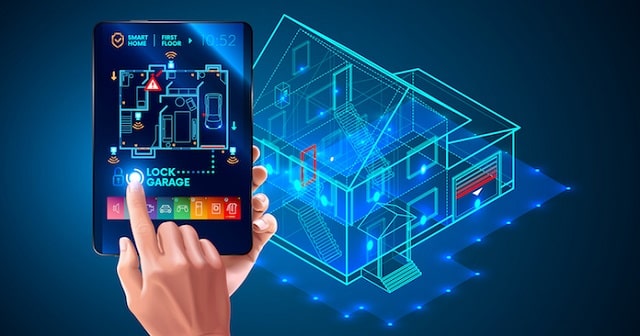
1. A New Dimension of Security: Homes and Businesses
In an era marked by unprecedented technological advancements, security has reached new heights. Just look at the potential of solutions like evalink! Smart technology has brought forth a myriad of innovative tools that are bolstering the safety of both homes and businesses. Here are some remarkable aspects to consider:
Smart Surveillance: Traditional security cameras have evolved into intelligent, connected devices that offer high-definition live feeds, remote access, and even facial recognition capabilities. These features provide homeowners and businesses with real-time monitoring and the ability to respond swiftly to potential threats.
Smart Locks: Say goodbye to the hassle of fumbling for keys! Smart locks enable homeowners and businesses to control access digitally, allowing authorized personnel to enter via mobile apps or biometric recognition. This not only enhances convenience but also strengthens security by eliminating the risk of lost or duplicated keys.
AI-Powered Threat Detection: Artificial intelligence has given rise to predictive security systems that analyze data from various sources to anticipate potential security breaches. Whether it is identifying unusual behavior or detecting unauthorized access patterns, these systems provide an extra layer of protection.
Integration With Emergency Services: In the unfortunate event of a break-in or emergency, smart security systems can automatically alert the appropriate authorities. This seamless integration ensures rapid response times, minimizing potential damage and harm.
2. Homes That Learn And Adapt
Imagine a home that anticipates your needs and adjusts its environment to match your preferences. This futuristic concept is becoming a reality, thanks to the integration of smart technology.
Smart Thermostats: These devices not only regulate temperature but also learn your schedule and adjust settings accordingly. By analyzing your usage patterns, they optimize energy consumption, leading to cost savings and reduced environmental impact.
Ambient Lighting: Smart lighting systems offer a spectrum of customizable options, from adjusting color and intensity to syncing with your circadian rhythm. This not only enhances aesthetics but also supports your well-being.
Intuitive Appliances: With the advent of the Internet of Things (IoT), appliances can now communicate with each other. For instance, your coffee maker can sync with your alarm clock, ensuring a fresh cup of joe greets you as you wake up.
3. The Rise Of Intelligent Workspaces
In the corporate world, smart technology is reshaping the way businesses operate, enhancing efficiency, collaboration, and employee satisfaction.
Connected Conference Rooms: Meetings are evolving beyond whiteboards and slide presentations. Smart conference rooms boast interactive displays, video conferencing capabilities, and wireless connectivity, fostering more dynamic and productive discussions.
Efficient Energy Management: Smart sensors and automation systems monitor energy usage within office spaces, optimizing lighting, heating, and cooling based on occupancy. This not only reduces operational costs but also contributes to sustainability efforts.
Data-Driven Decision Making: Businesses now have access to real-time data that provides insights into employee behavior, space utilization, and workflow patterns. This information enables informed decisions that can enhance productivity and streamline operations.
4. Urban Innovation: Smart Cities Taking Shape
The transformation brought about by smart technology isn't limited to individual spaces; it is also reshaping entire cities, ushering in a new era of urban living.
Smart Traffic Management: Traffic congestion is a ubiquitous urban woe. Smart traffic management systems use real-time data to optimize traffic flow, alleviate congestion, and reduce commute times.
Waste Management Revolution: Smart waste bins equipped with sensors signal when they are full, streamlining waste collection routes and minimizing unnecessary pickups. This results in a cleaner environment and more efficient resource allocation.
Community Engagement: Smart city platforms provide avenues for citizens to engage with local authorities, report issues, and participate in decision-making processes. This fosters a sense of community ownership and empowerment.
5. Healthcare In The Digital Age
Smart technology is also revolutionizing healthcare, making it more accessible, efficient, and personalized.
Telemedicine: Remote consultations and health monitoring are made possible through telemedicine platforms. Patients can connect with healthcare professionals regardless of geographical barriers, improving access to medical care.
Wearable Health Tech: Smart wearable devices track vital signs, activity levels, and even detect irregularities in real time. This data enables early detection of health issues and empowers individuals to take control of their well-being.
Predictive Diagnostics: AI-powered algorithms analyze medical data to predict potential health risks and diagnoses. This proactive approach aids in early intervention and preventive care.
6. Sustainable Living Through Smart Tech
As the global focus shifts toward sustainability, smart technology is playing a pivotal role in promoting eco-friendly practices.
Smart Energy Management: Homeowners and businesses can monitor energy consumption in real time, identifying areas of wastage and taking steps to reduce their carbon footprint.
Water Conservation: Smart irrigation systems analyze weather forecasts and soil conditions to optimize watering schedules, reducing water usage while maintaining lush landscapes.
Green Building Solutions: Smart building materials and designs contribute to energy efficiency and improved insulation. From solar panels to automated shading, these features minimize reliance on non- renewable resources.
7. Enhanced Accessibility And Inclusion
Smart technology is breaking down barriers, creating more inclusive environments for individuals with disabilities.
Voice-Activated Interfaces: Voice commands enable hands-free interaction with devices, benefiting individuals with mobility impairments or visual impairments.
Smart Assistive Devices: From smart wheelchairs to wearable navigation aids, assistive devices are incorporating smart technology to enhance mobility and independence.
Connected Environments: Smart homes and cities can be tailored to accommodate diverse needs, such as adjusting lighting, temperature, and access based on individual preferences.
Top Tech For Smart Homes And Cities
In conclusion, the profound impact of smart technology on our homes, businesses, and cities is undeniable. From redefining security to fostering sustainable practices and enhancing accessibility, the possibilities seem limitless. As we continue to embrace these innovations, it is imperative to strike a balance between convenience and privacy, ensuring that our ever-connected world remains a safe and enriching space for all.
